(完整版)译林版七年级英语上册第一
- 格式:docx
- 大小:21.44 KB
- 文档页数:4
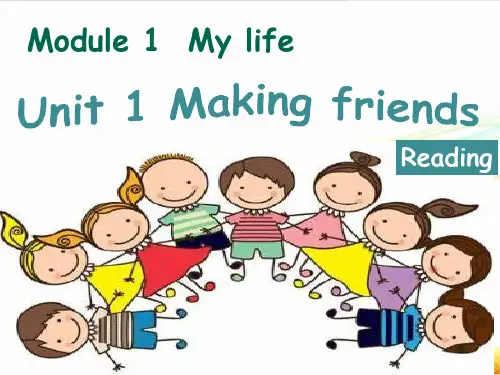
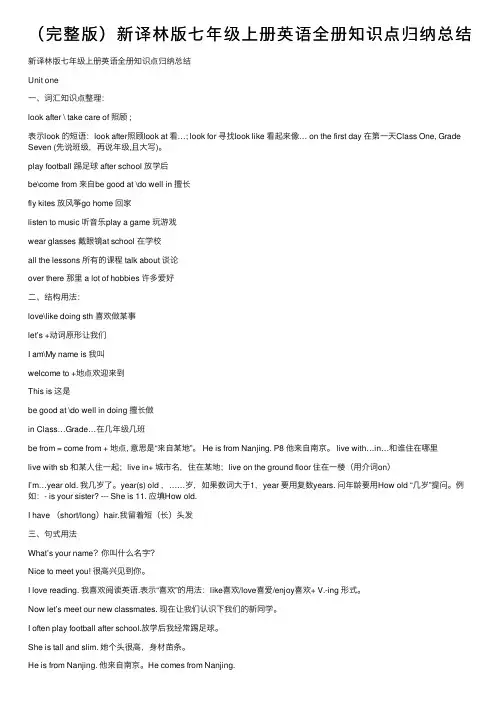
(完整版)新译林版七年级上册英语全册知识点归纳总结新译林版七年级上册英语全册知识点归纳总结Unit one⼀、词汇知识点整理:look after \ take care of 照顾 ;表⽰look 的短语:look after照顾look at 看…; look for 寻找look like 看起来像… on the first day 在第⼀天Class One, Grade Seven (先说班级,再说年级,且⼤写)。
play football 踢⾜球 after school 放学后be\come from 来⾃be good at \do well in 擅长fly kites 放风筝go home 回家listen to music 听⾳乐play a game 玩游戏wear glasses 戴眼镜at school 在学校all the lessons 所有的课程 talk about 谈论over there 那⾥ a lot of hobbies 许多爱好⼆、结构⽤法:love\like doing sth 喜欢做某事let’s +动词原形让我们I am\My name is 我叫welcome to +地点欢迎来到This is 这是be good at \do well in doing 擅长做in Class…Grade…在⼏年级⼏班be from = come from + 地点, 意思是“来⾃某地”。
He is from Nanjing. P8 他来⾃南京。
live with…in…和谁住在哪⾥live with sb 和某⼈住⼀起;live in+ 城市名,住在某地;live on the ground floor 住在⼀楼(⽤介词on)I’m…year old. 我⼏岁了。
year(s) old ,……岁,如果数词⼤于1,year 要⽤复数years. 问年龄要⽤How old “⼏岁”提问。
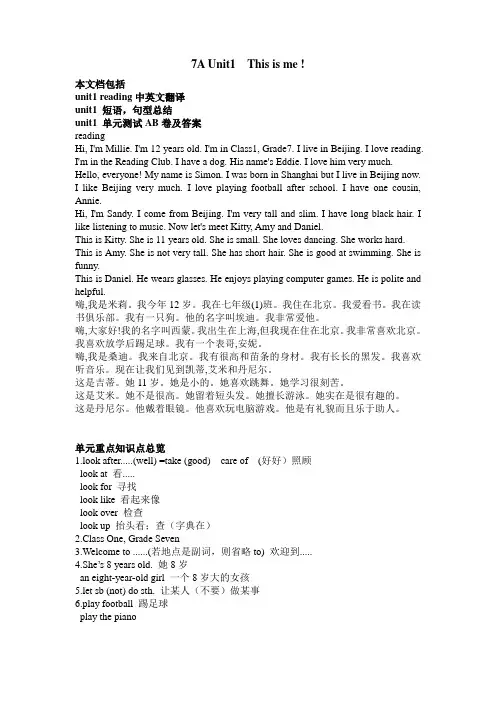
7A Unit1 This is me !本文档包括unit1 reading中英文翻译unit1 短语,句型总结unit1 单元测试AB卷及答案readingHi, I'm Millie. I'm 12 years old. I'm in Class1, Grade7. I live in Beijing. I love reading. I'm in the Reading Club. I have a dog. His name's Eddie. I love him very much. Hello, everyone! My name is Simon. I was born in Shanghai but I live in Beijing now.I like Beijing very much. I love playing football after school. I have one cousin, Annie.Hi, I'm Sandy. I come from Beijing. I'm very tall and slim. I have long black hair. I like listening to music. Now let's meet Kitty, Amy and Daniel.This is Kitty. She is 11 years old. She is small. She loves dancing. She works hard. This is Amy. She is not very tall. She has short hair. She is good at swimming. She is funny.This is Daniel. He wears glasses. He enjoys playing computer games. He is polite and helpful.嗨,我是米莉。
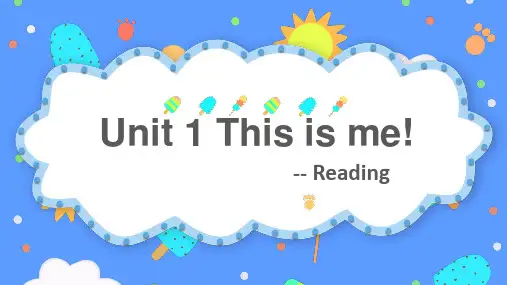
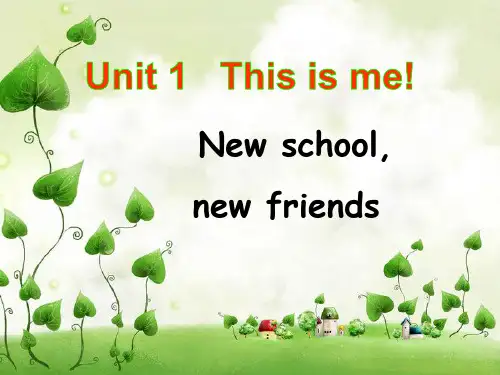
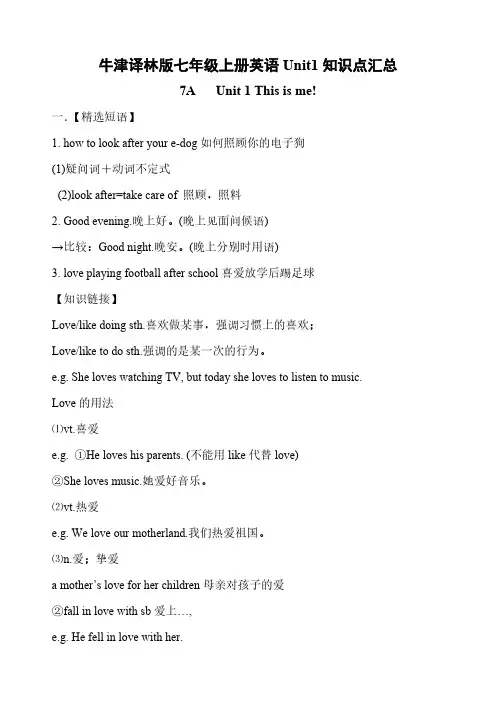
牛津译林版七年级上册英语Unit1知识点汇总7A Unit 1 This is me!一.【精选短语】1. how to look after your e-dog如何照顾你的电子狗(1)疑问词+动词不定式(2)look after=take care of 照顾,照料2. Good evening.晚上好。
(晚上见面问候语)→比较:Good night.晚安。
(晚上分别时用语)3. love playing football after school喜爱放学后踢足球【知识链接】Love/like doing sth.喜欢做某事,强调习惯上的喜欢;Love/like to do sth.强调的是某一次的行为。
e.g. She loves watching TV, but today she loves to listen to music. Love的用法⑴vt.喜爱e.g. ①He loves his parents. (不能用like代替love)②She loves music.她爱好音乐。
⑵vt.热爱e.g. We love our motherland.我们热爱祖国。
⑶n.爱;挚爱a mother’s love for her children母亲对孩子的爱②fall in love with sb爱上…,e.g. He fell in love with her.③我们可在书信的结尾处看到例如Love Mary这样的署名,意思是With my love, Mary,一方面表示情感,一方面表示道别。
【用法拓展】lovely美丽的;可爱的e.g. lovely hair秀发,a lovely girl美丽的少女4. be good at sth/doing sth=do well in sth/doing sth擅长;在某方面表现好【知识链接】⑴He is good at telling funny jokes.⑵She always does well in English.5. wear glasses戴眼镜→ wear后接服装、装饰品等,表示“穿、戴”。
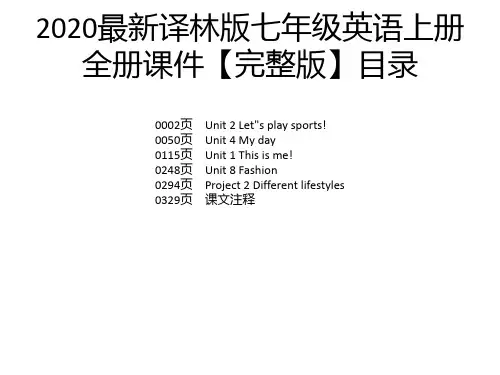
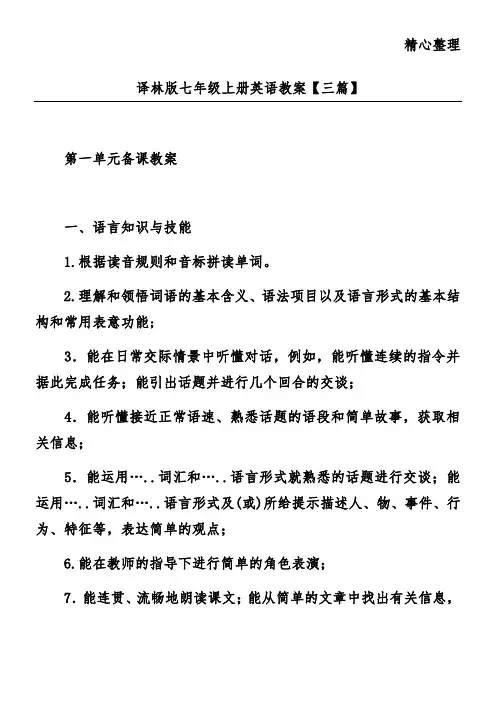
精心整理译林版七年级上册英语教案【三篇】第一单元备课教案为、特征等,表达简单的观点;6.能在教师的指导下进行简单的角色表演;7.能连贯、流畅地朗读课文;能从简单的文章中找出有关信息,理解大意;根据上下文猜测生词的意思;8.每天课外阅读量最少达到100词。
9.能运用…..词汇和…..语言形式以及参照范例(文章结构)写出简单的文段等,包括起草和修改。
11-(6)利用预测、跳读、寻读、细节读等来获取文章信息。
11-(7)仿写短文,准备素材、起草短文并修改。
11-(8)明确目标,制定计划,11-(9)了解并跨文化交际(恰当使用)。
四、情感态度12.乐于参与英语活动,敢于用英语表达,积极与他人合作,体验自己的学习效果。
备教学11-(2)11-(3)目标2词汇:name,nice,to,meet,too,your,Ms.,his,and,her,yes,she,he,no,no t.语言形式:语言形式:1)What’s yourphonenumber?---It’s…/Myphonenumberis…2)Isthisyourphonenumber?---Yes,itis./No,itisn’t.3)What’syourfirst/given/last/familyname?---Myfirst/given/l ast/familyname’s…第二单元备课教案6.能在教师的指导下进行简单的角色表演;7.能连贯、流畅地朗读课文;能从简单的故事和短文中找出有关信息,抓住大意;根据上下文猜测生词的意思;8.每天课外阅读量最少达到200词。
9.能运用…..词汇和…..语言形式以及参照范例(文章结构)写出简单的文段等,包括起草和修改。
二、文化意识10.了解语言和语用的文化因素,体验跨文化交际。
11-(8)明确目标,制定计划,11-(9)了解并跨文化交际(恰当使用)。
四、情感态度12.乐于参与英语活动,敢于用英语表达,积极与他人合作,体验自己的学习效果。

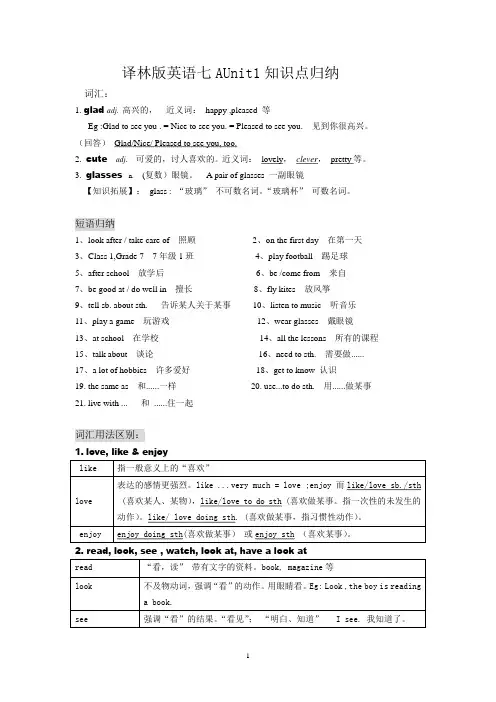
译林版英语七AUnit1知识点归纳词汇:1. glad adj. 高兴的,近义词:happy ,pleased 等Eg :Glad to see you . = Nice to see you. = Pleased to see you. 见到你很高兴。
(回答)Glad/Nice/ Pleased to see you, too.2. cute adj. 可爱的,讨人喜欢的。
近义词:lovely,clever,pretty等。
3. glasses n.(复数)眼镜。
A pair of glasses 一副眼镜【知识拓展】:glass : “玻璃”不可数名词。
“玻璃杯”可数名词。
短语归纳1、look after / take care of 照顾2、on the first day 在第一天3、Class 1,Grade 7 7年级1班4、play football 踢足球5、after school 放学后6、be /come from 来自7、be good at / do well in 擅长8、fly kites 放风筝9、tell sb. about sth. 告诉某人关于某事10、listen to music 听音乐11、play a game 玩游戏12、wear glasses 戴眼镜13、at school 在学校14、all the lessons 所有的课程15、talk about 谈论16、need to sth. 需要做...... 17、a lot of hobbies 许多爱好18、get to know 认识19. the same as 和......一样20. use...to do sth. 用......做某事21. live with ... 和......住一起词汇用法区别:1.love, like & enjoy2. read, look, see , watch, look at, have a look at本单元应该掌握的句子:1.What’s your name?你叫什么名字?2.Nice to meet you! 很高兴见到你。

英语七年级上册译林版教材Unit 1 Hello!In the first unit of the English textbook for seventh-grade students, we are introduced to the basics of greetings and introductions in English. Throughout this unit, students will learn how to say hello and goodbye, introduce themselves and others, and ask simple questions to get to know someone. The unit focuses on building a foundation for communication in English and creating a welcoming classroom environment. Let's explore the key topics covered in this unit.1. Greetings and GoodbyesThe unit begins with teaching students how to greet others in English. They learn common greetings such as "Hello," "Hi," and "Goodmorning/afternoon/evening." The lesson emphasizes the importance of using appropriate greetings according to the time of day. Students also practice responding to greetings with phrases like "Hi, how are you?" and "I'm fine, thank you."Additionally, the unit introduces different ways to say goodbye, including "Goodbye," "Bye," and "See you later." Students are taught to use these phrases when leaving someone or ending a conversation politely.2. Introducing YourselfIn this section, students learn how to introduce themselves in English. They are taught to say their names, ages, nationalities, and where they come from using simple sentences. Vocabulary related to personal information,such as "name," "age," "country," and "city," is introduced and practiced through various exercises and conversations. Students practice introducing themselves to their classmates and engage in simulated dialogues to reinforce their learning.3. Introducing OthersAfter learning self-introductions, students move on to introducing others. They learn how to ask and answer questions to gather information about their classmates and introduce them to others. The lesson includes practicing phrases like "What's his/her name?" and "Where is he/she from?" Students also learn to respond to these questions by stating the person's name, age, and nationality. This activity promotes interaction among students and encourages them to get to know each other better.4. Asking Simple QuestionsIn this section, students develop their conversational skills by learning how to ask and answer simple questions. They are introduced to question words such as "What," "Where," and "How." The lesson provides examples of how to use these words in questions like "What's this?" and "How old are you?" Students learn to ask questions about personal information, daily routines, and school subjects to engage in meaningful conversations.5. Classroom LanguageTowards the end of the unit, students are introduced to essential classroom language. The lesson covers phrases and expressions used during lessons, such as requesting help, asking for clarification, and expressingunderstanding. Students practice using these phrases in role-play activities and understand their significance in creating a positive learning environment.Throughout this unit, students are encouraged to actively participate in classroom activities, engage in pair and group work, and practice their language skills through authentic communication. The textbook provides a variety of exercises, games, and role-plays to make learning enjoyable and effective.In conclusion, the first unit of the seventh-grade English textbook focuses on greetings, introductions, and basic conversational skills. It aims to provide students with the necessary vocabulary and phrases to communicate in English and create a welcoming classroom atmosphere. By mastering the content of this unit, students will be well-prepared to interact with others using simple English phrases and express themselves confidently.。
牛津译林版七年级英语上册Unit 1 知识点梳理(上)复习导入知识点梳理一.词汇&短语:WORDS&PHRASES1. What’s your name? 你叫什么名字?My name is Hobo. 我的名字叫霍波。
What’s your name ?是询问对方名字的一句问话。
其回答句是___My name is__________,也可以用如:或者说“And what’s your name?”_____I’m________。
如想反问对方时可说:“And you”_____________________________你叫什么名字?What’s your name_____________________________我叫米莉My name is Millie【拓展】询问对方名字还可以说:你能告诉我你的名字吗?_____________________________Could you tell me your name?我可以知道你的名字吗?_____________________________May I have your name?2. ——Are you my master?你是我的主人吗?——Yes, I am. 是的,我是。
__Are you______这是一个一般疑问句,要用yes或no来回答。
肯定回答是___Yes,I am_____________,I am不能缩写。
否定回答是____No, I’m not____________。
这一句句型可以用来询问姓名,职业或者其他情况。
如:——____Are you____Sandy?你是桑迪吗?是的,我是。
/不,我不是。
——___Yes, I am _____ /_No, I’m not_______——___Are you_____a teacher? 你是老师吗?——Yes, I am. 是的,我是She is good at playing the piano.(改为一般疑问句)_____Is she good at playing the piano___________________3. Good morning.早上好Good morning意为“早上好”,是人们上午见面时经常说的一句问候语。
一.词汇:(20分)
A根据句意及汉语提示,写出单词的适当形式,使句子意思完整、正确。
(10分)
1. Now I have many new _______ (同学)
2.My grandparent is about ninety _________ (岁) old.
3. Is ______ (每人) here?
4.Sandy is tall and __________(苗条).
5.As we all know,Hobo is an _________ (电子狗).
6.I am in Class 1,_________ (年级) 7 at Sunshine Middle School.
7.Daniel , your __________ (眼镜)look too cool.
8.--- Do you like any sports ? ---- yes, I like _________ (散步).
9. Li Hua is my favourite football player . I hope his __________ (梦想)comes true.
10.--- What do you usually do in your _______(空闲的) time?
----I usually do some _______(画画).
B.用所给单词的适当形式填空(10分)
1. I love_________(I) school.
2. Sandy often __________ (listen) to English songs.
3. Which class___________ (be) Millie and Simon in?
4. We are good at __________ (swim).
5.Eddie doesn’t know how to _________ (look ) after Hobo.
6.This is my new friend .He loves __________ (read).
7.Mr.Wu is 20 ________ (year) old. He is our English teacher.
8.Andy __________ (have) some new friends at Sunshine Middle School.
9.Nice ____________ (see) you, Millie.
10.____________the girl __________(come) from the USA?
二、单项选择(共10小题;每小题1分,满分10分)
1. ----Are you my new English teacher?
----________________.
A.Yes, I do
B.Yes, I am
C. Yes, I can.
D. I’m sorry. I don’t know.
2. Simon likes________, but I ________playing football after school.
A. reading; loving
B. read; love
C. reading; love
D. read;loving
3.Mike is very good _________ Maths and English.
A. in
B. at
C. to
D. for
4. --- ________________?
--- He looks strong.
A.How old is he?
B.How does he look?
C. What does he like?
D. Where is he from?
5. ___________you __________the bus every day?
A. Are; take
B. Do; take
C. Does; take
D. Do; takes
6.___________he ____________Japanese?
A. Do; read
B. Does; say
C. Does; speak
D. Do; write
7. ----______________your classroom clean?
----Yes.We ____________it after school every day.
A. Does; cleans
B. Are; clean
C. Do; cleans
D. Is ; clean
8.Li Hua wants______________ in the next World Cup.
9.Amy wants_____________home.
A.walk
B.to walk
C. to walk to
D. walking
10._________your trousers black or blue?
A. Are
B.Am
C.Is
D.Do
三、填空(共7小题;每空1分,满分10分)
1.______(be)your sister good at singing?
2.Who teaches_______________(they) Maths this term?
3.My best friend Kitty _______________(study) in Shanghai.
4. _________your friends usually________________(fly) kites in the park ?
5. After school, he always ________________ (finish) his homework first.
6. He has lunch at school.(改为一般疑问句)
________he________lunch at school?
lie does her homework at school.(改为否定句)
Millie _____________________her homework at school.
四、请根据汉语意思,完成句子.(共5小题;每空0.5分,满分10分)
1.我爸爸不擅长玩电脑游戏。
My father ______ _______ _______ ________ __________ _________. 2.我们的教室大吗?
___________ ____________ _____________ ____________?
3.我的老师们都友善。
My teachers __________ __________ nice.
4. Tom来自北京,但是现在住在上海。
Tom __________ _________Beijing, but he __________ _________ Shanghai now.
5.Amy留长发,但是不带眼镜。
Amy_________ _________ _________,but she _________ _________ glasses.。